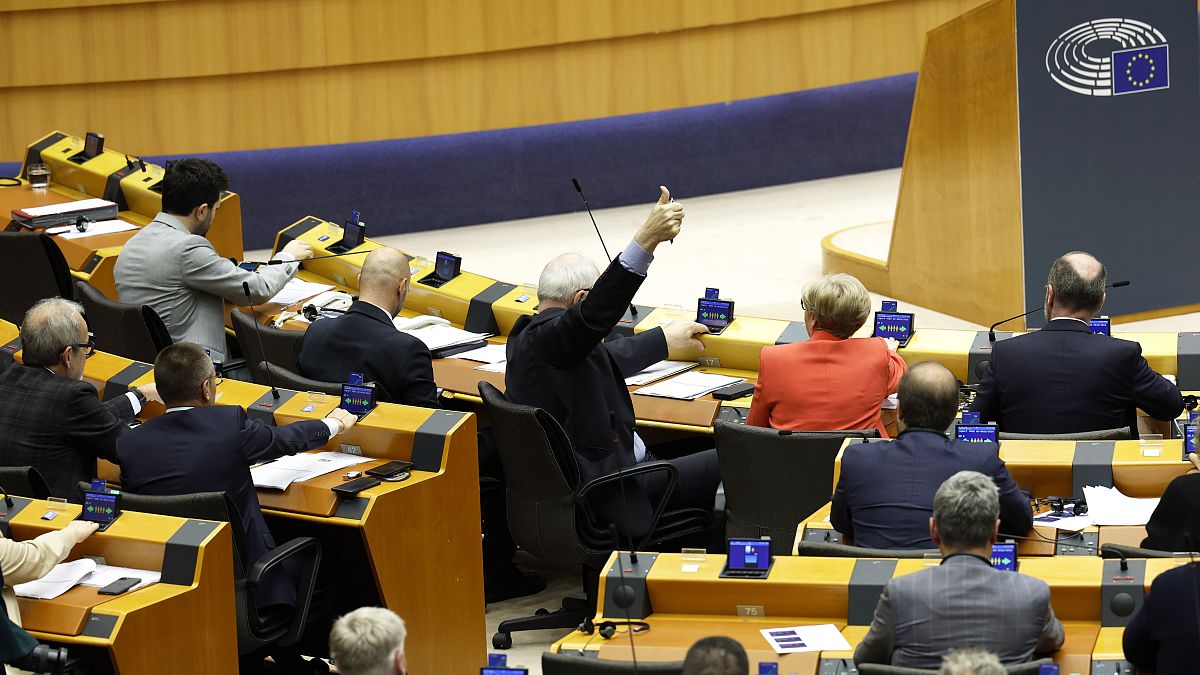In this edition of State of the Union, we focus on the climate ruling against Switzerland, fairness in the European election campaign and the new EU Migration and Asylum Pact
Switzerland is a country we rarely talk about on this show.
The Confederacy is not a member of the EU, but it ranks highest in the politically stable, well-governed and with high ethical standards metrics. It also appears among the top five nations in the Sustainable Future ranking.
That last reputation, though, took a heavy blow this week.
The European Court of Human Rights ruled that Swiss authorities are responsible for not implementing efficient climate policies and thus violating the right to life of its people.
The judgment doesn’t include any sanctions but sets an important precedent that will likely reverberate across future lawsuits.
The reaction of the Swiss government was rather meek.
“Sustainability is very important for Switzerland," said Swiss Federal President Viola Amherd.
"Biodiversity is very important for Switzerland. For Switzerland, the net zero target is very important. We are working on it and will continue to do so with all our strength in the future. This ruling doesn't change that.”
The ruling of the Court is binding, meaning Switzerland must act. If Bern does, it would add enormous credibility to the democratic system.
Gaining democratic credibility was also on the EU agenda this week.
To ensure transparency and fairness in the upcoming European elections, almost all political groups in the Parliament signed a code of conduct.
The signatories especially pledged not to produce, use or disseminate misleading content, generated for example by artificial intelligence.
Brussels praised the code of conduct as an important means to fight against the high level of public distrust in the European institutions.
"Something is rotten in Brussels. I heard it from many places," said EU Commission Vice President Věra Jourová.
"We have to proactively do something against this feeling of people that, well, it makes no sense to go to elect because the system is dirty. The system is not dirty."
And right on cue the system showed that it can produce meaningful results.
After years of negotiations, the European Parliament adopted the new EU Migration and Asylum Pact.
A series of laws designed to streamline migration policy and fix the current status quo.
Yet, the compromise is not appreciated everywhere.
Some wanted even tougher rules, others worry about the respect of human rights of migrants and their families.
To discuss this, we invited Eve Geddie, Head of the European Institutions Office of Amnesty International and Director of Advocacy.
Euronews: So, Amnesty has been very critical of the reform package since it was first proposed four years ago. I’ll come to this criticism in a minute. But first, are there any positive elements of the Pact?
Geddie: Well, it's positive in that we do have now an agreement, positive in that the ongoing negotiations have come to a close. But in terms of the technical details of the agreement, for us, this is not at all positive. What we have really here is a downgrading of asylum law. We have also, you know, a rollout of detention, (an) increase of detention and normalisation of detention, across Europe. And we have what is really kind of a lowest common denominator approach. There is really (an) opportunity for Europe as a group of 27 states with a common approach, we think, to come up with something really, very much better.
Euronews: You’re saying the Pact would put people at heightened risk of human rights violations – why is that so?
Geddie: Exactly. Because, I mean, what we're seeing also is with this pact that there's going to be less legal support for people when they arrive. They'll be put through an accelerated procedure. And with this pact, EU member states have created this legal fiction of non-entry, so that a person can be on European territory physically, but actually denied by the pact the protections and rights which align with that. That's also something that is very concerning even beyond migration, just for rule of law and human rights in Europe more generally.
Euronews: Yet the defenders of the reform consider it a fair improvement between far-right obstructionism and far-left fantasy solutions. Where do you come down on this?
Geddie: I think we would like to see kind of less pride from legislators on reaching an agreement and actually more responsibilities about the real consequences of this agreement. And for us, it will really not do anything to improve Europe's common response to migration and protect all peoples at borders. We've long been calling on the EU institutions and member states to move away from short-term political interests, which sideline human rights, and really look (at) like a longer-term future-proof facility. Again, there are a lot of criticisms on both sides.
Euronews: Worldwide, more than 110 million people are forcibly displaced – what can we expect when the Pact comes into force in 2026?
Geddie: These standards are much lower than we would have liked, and which actually international law and international refugee law require. It is important, I think, that the Commission starts also enforcing the standards that it has in place. It's not that we've come to 2024 with no EU standards or international standards. We have those. But what we have is member states opting in and opting out and flagrantly often violating these standards. So, a key thing for us will be enforcement, accountability for standards that do exist.
